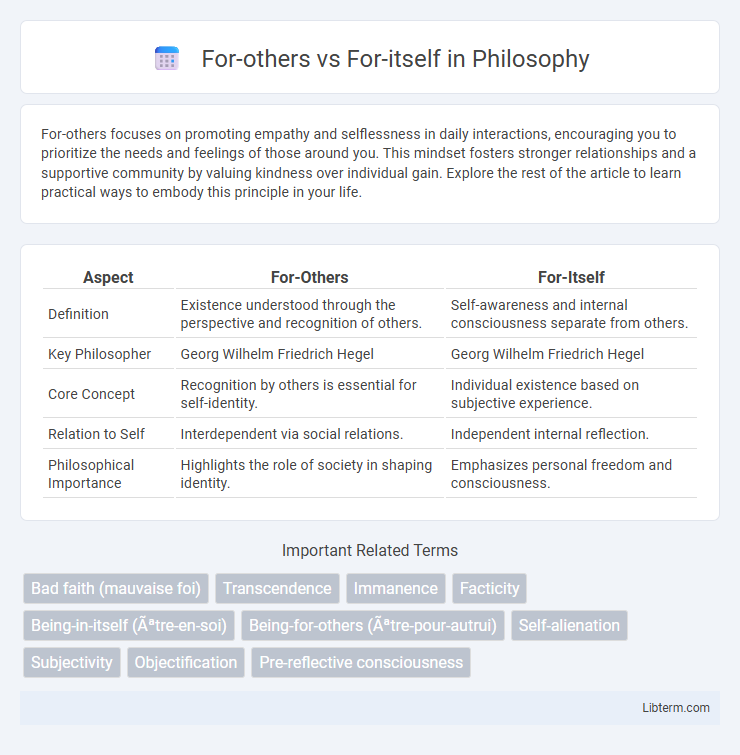For-others focuses on promoting empathy and selflessness in daily interactions, encouraging you to prioritize the needs and feelings of those around you. This mindset fosters stronger relationships and a supportive community by valuing kindness over individual gain. Explore the rest of the article to learn practical ways to embody this principle in your life.
Table of Comparison
| Aspect | For-Others | For-Itself |
|---|---|---|
| Definition | Existence understood through the perspective and recognition of others. | Self-awareness and internal consciousness separate from others. |
| Key Philosopher | Georg Wilhelm Friedrich Hegel | Georg Wilhelm Friedrich Hegel |
| Core Concept | Recognition by others is essential for self-identity. | Individual existence based on subjective experience. |
| Relation to Self | Interdependent via social relations. | Independent internal reflection. |
| Philosophical Importance | Highlights the role of society in shaping identity. | Emphasizes personal freedom and consciousness. |
Understanding the Concepts: For-Others vs For-Itself
The concepts of "For-Others" and "For-Itself" originate from existential philosophy, describing modes of self-consciousness and human existence. "For-Itself" refers to self-awareness and an individual's internal subjective experience, emphasizing autonomy and personal identity. In contrast, "For-Others" involves recognizing oneself through the perception and judgment of others, highlighting social interdependence and external validation in the formation of selfhood.
Origins and Philosophical Foundations
The concepts of "For-others" and "For-itself" originate from existentialist philosophy, particularly in Jean-Paul Sartre's works, where "For-itself" denotes conscious self-awareness, while "For-others" represents the individual's existence as perceived by others. These ideas highlight the tension between subjective autonomy and social recognition, underpinning Sartre's ontological exploration of being and the self-other dynamic. The philosophical foundation rests on phenomenology and existential ontology, emphasizing freedom, responsibility, and the relational nature of identity.
Key Thinkers: Sartre and the Notion of Being
Jean-Paul Sartre's existentialist philosophy centers on the tension between being-for-others and being-for-itself, where being-for-itself represents conscious self-awareness and freedom, while being-for-others involves the external perception and objectification by others. Sartre's concept of "the Look" (le regard) illustrates how individuals become aware of themselves as objects when perceived by others, leading to existential conflicts and the struggle for authentic existence. This dynamic highlights the interplay between personal subjectivity and social intersubjectivity, fundamental to Sartre's notion of being and identity formation.
Defining "For-Itself": Self-Awareness and Consciousness
For-itself refers to a state of self-awareness where an entity recognizes its own existence and experiences, distinguishing itself from mere objects or things. It embodies consciousness that enables reflection, intentionality, and autonomy, allowing one to act based on self-recognition rather than external stimuli alone. This concept plays a crucial role in existential philosophy, particularly in the works of Jean-Paul Sartre, who contrasts for-itself with for-others to explore the dynamics of self-identity and freedom.
Exploring "For-Others": The Social Dimension of Existence
The concept of "For-Others" emphasizes the social dimension of existence, where individuals define themselves through relationships and recognition by others. This social interdependence contrasts with "For-Itself," which focuses on autonomous self-consciousness and internal awareness. Understanding "For-Others" reveals how identity, ethics, and meaning emerge from interactions within a community and mutual recognition.
Interplay Between Self and Others
The interplay between For-others and For-itself highlights the dynamic balance where an individual's identity evolves through social recognition and personal autonomy. This relationship reveals how self-consciousness arises simultaneously from internal reflection and external validation, shaping authentic existence. Understanding this tension deepens insights into human motivation, ethical responsibility, and the development of intersubjective meaning.
Authenticity and Bad Faith in Relationships
Authenticity in relationships involves expressing genuine thoughts and feelings, aligning with the concept of "For-itself," where individuals maintain self-awareness and personal freedom. "For-others" entails adapting or conforming to external expectations, which can lead to bad faith--a denial of true self under social pressures. Balancing authenticity requires resisting bad faith by embracing self-ownership without losing empathy for others, fostering relationships built on honest and respectful self-expression.
Implications for Personal Identity
For-others and For-itself highlight distinct modes of self-consciousness impacting personal identity development. The For-others perspective centers on how external recognition shapes self-awareness, making identity reliant on social validation and intersubjective relationships. In contrast, the For-itself approach emphasizes internal agency and self-reflection, grounding personal identity in autonomous self-definition and subjective experience.
For-Others and Social Responsibility
For-others orientation emphasizes altruism, prioritizing the needs and welfare of others over personal gain, which fosters a strong sense of social responsibility in communities and organizations. This mindset drives cooperative behaviors, ethical decision-making, and sustainable practices that benefit society as a whole. Corporate social responsibility (CSR) initiatives and community engagement programs often reflect a for-others approach, enhancing social equity and environmental stewardship.
For-Itself in Modern Psychological Thought
In modern psychological thought, the concept of "For-Itself" emphasizes self-awareness and conscious agency, where individuals actively define their existence through choices and reflective processes. This perspective highlights personal responsibility and intentionality as central to human behavior, contrasting with "For-Others," which centers on social relationships and external validation. Understanding "For-Itself" deepens insights into autonomy, identity formation, and motivational dynamics within contemporary theories like existential psychology and humanistic approaches.
For-others Infographic

 libterm.com
libterm.com